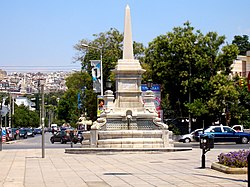This article includes a list of references, related reading, or external links, but its sources remain unclear because it lacks inline citations .(August 2021) |
This is a list of notable fountains in Greece .
| Name | Location | Era | Image |
|---|---|---|---|
| Argyrocastrou Square fountain | Rhodes (city) | Knights period |  |
| Abdulhamid Pasha fountain | Chios (town) | Ottoman period |  |
| Bembo fountain | Heraklion | Venetian period |  |
| Chersonesos fountain | Hersonissos | Roman period |  |
| Central square fountain | Larissa | Modern period |  |
| Georgiou I Square fountain | Patras | Modern period |  |
| Hippocampus fountain | Square of the Jewish Martyrs, Rhodes (city) | Italian period |  |
| Hippokratous Square fountain | Rhodes (city) | Knights period |  |
| Idomeneas fountain | Heraklion | Ottoman period |  |
| Kotzia fountain | Kotzia Square, Athens | Modern period |  |
| Ladadika fountain | Ladadika, Thessaloniki | Modern period | |
| Mandraki fountain | Harbour of Rhodes (city) | Italian period |  |
| Metaxourgeio fountain | Metaxourgeio, Athens | Modern period |  |
| Morosini fountain | Lions Square, Heraklion | Venetian period |  |
| Neptune (Poseidon) fountain | Diafani, Karpathos | Modern period |  |
| Navarinou fountain | Navarinou Square, Thessaloniki | Modern period |  |
| Old fountain | Fountain Square, Thessaloniki | Ottoman period |  |
| Omonoia fountain | Omonoia Square, Athens | Modern period |  |
| Pirene fountain | Ancient Corinth | Roman period |  |
| Priuli fountain | Heraklion | Venetian period |  |
| Rimondi fountain | Rethymno | Venetian period |  |
| Spilias Square fountain | Corfu | Modern period |  |
| Spianada fountain | Spianada, Corfu | Modern period |  |
| Syntagma Square fountain | Athens | Modern period, designed by Ernst Ziller |  |
| Turkish fountain | Chania | Ottoman period |  |
| Venizelou Square fountain | Chania | Venetian period |  |
| Zappeion fountain | Zappeion, Athens | Modern period |  |